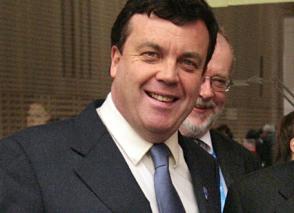A charming man trying to do an impossible job

Brian Lenihan was uninsultable - as was his father and as is his brother, Conor. It is a lovely trait, bespeaking humility and tolerance. Quite a contrast from the more familiar characteristic of preciousness, that capacity to search for insult and offence in the most casual remarks.
Brian was not insulted - or even much dejected - by the cancer diagnosis before Christmas 2009. He just got on with his job.
Like his father, he was far cleverer than he appeared at first, far better read, more insightful than he let on. I don’t think he was quite as soft as his father, but certainly he was a warm man. Instinctively, he liked people and accorded them respect, again like his father.
There was a bit of eccentricity there, a charming eccentricity; maybe not quite as eccentric as Conor, although there are competing views on that.
His indiscretion was wondrous for a journalist. I recall meeting him in Leinster House during the height of the Bertie Ahern dénouement, when Brian was Minister for Justice.
The meeting was to do with prisons, but it was difficult to get him to talk about that. He wanted to talk about Ahern, and Ahern’s stories about winning loads of sterling on the gee-gees. Much later, I was curious about Brian’s dealings with a senior public official, and about remarks this person had made - remarks which contradicted claims made by Brian.
He told me you could not believe a word this guy said. I was later to suspect that Brian was correct.
Brian Lenihan never spoke to me about Brian Cowen, but I knew he spoke to others and was very frank about his difficulties in dealing with him.
My understanding is that they’d had no personal relationship for months before both left office.
Brian’s appointment as Minister for Finance by Cowen in May 2008 was a bold one, as he had no previous experience in that area.
I suspect he took a few months to get to grips with the brief, an induction that may not have been helped by a prolonged celebration of the change of government, on Ahern’s retirement.
Certainly it does not seem that the scale of the impending banking crisis was tackled until he and Cowen were panicked into the blanket bank guarantee on the night of September 29, 2008.
The crisis had been foretold in an internal Department of Finance document drafted in early 2008 and, almost certainly, alarm bells were ringing in the National Treasury Management Agency (NTMA) From then on as well.
Why the government decided to give a blanket guarantee, having been expensively advised not to do so by Merrill Lynch, has not been explained.
The constitutional propriety of what they did must also be in doubt - only the two Brians were present when the fateful decision was taken, and they dressed it up as a cabinet decision by having officials phone the other cabinet ministers in the middle of the night to get their perfunctory approval.
The constitution requires that the cabinet act as a ‘‘collective authority’’, but there was nothing collective about what occurred that night.
I have some sympathy for Brian in his not anticipating the separate meltdown of the economy at that stage.
The ESRI medium term review, which was published in July 2008, foresaw a slight downturn in the economy in the latter part of 2008 and into 2009, then a return to robust growth - but no suggestion of an economic meltdown.
Brian’s early performance in the Department of Finance was, I thought, indifferent - but, once the crisis broke, he was formidable. As has been said so much over the last few days, intellectually he was very able.
He had a great capacity to master a brief quickly, and then to present it brilliantly. He never showed quite that level of ability at the Bar, I think, but that brilliance was perhaps deliberately disguised until it was necessary to display it.
Quite what happened in the lead up to the EU/IMF rescue deal is not clear.
Brian’s version was that he was bounced into it by the ECB and tried to resist it - hence the denials of negotiations.
The alternative version is that he agreed with Central Bank governor Patrick Honohan, Kevin Cardiff, secretary general of the Department of Finance, and John Corrigan, head of the NTMA, in early November that a rescue package was necessary because of the torrent of deposits flowing out of the banks.
Brian’s reputation was damaged by that confusion, and it probably cost him the Fianna Fáil leadership to Micheál Martin in January.
On the morning of March 16, I sent him a text urging him to write a quick book on his 34 momentous months as Minister for Finance. He phoned back a minute or two later, saying he might just do that, and suggesting that we go for a few drinks some time soon afterwards. Sadly, however, it never happened.
